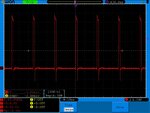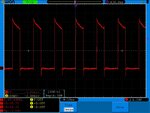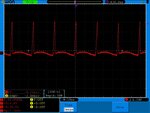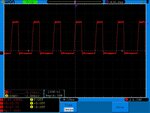jagdeepsingh3@hotmail.it
Member level 3

- Joined
- Sep 2, 2012
- Messages
- 54
- Helped
- 1
- Reputation
- 2
- Reaction score
- 2
- Trophy points
- 1,288
- Activity points
- 1,634
Smps transformer design with copper foil/strip Please help
Hi guys first i want to tell that my english is not good because i'm from itay
my problem is calculating transformer details (primary and secondry turns)
i'm using this circuit:

HERE ARE THE PICTURES OF WAVEFORMS:
ON GATE DRIVER MOSFET:


ON IGBT LOW SIDE GATE:


INPUT VOLTAGE IS 230Vac
OUTPUT VOLTAGE IS 3Vdc TO 60Vdc
OUTPUT CURRENT IS: 60A MAX
i ha ve EE 70/33/32 CORE
**broken link removed**
CAN SOMEONE PLEASE HELP TO CALCULATING WINDING DETAIL WITH COPPER FOIL
THANKS IN ADVANCE
Hi guys first i want to tell that my english is not good because i'm from itay
my problem is calculating transformer details (primary and secondry turns)
i'm using this circuit:

HERE ARE THE PICTURES OF WAVEFORMS:
ON GATE DRIVER MOSFET:


ON IGBT LOW SIDE GATE:


INPUT VOLTAGE IS 230Vac
OUTPUT VOLTAGE IS 3Vdc TO 60Vdc
OUTPUT CURRENT IS: 60A MAX
i ha ve EE 70/33/32 CORE
**broken link removed**
CAN SOMEONE PLEASE HELP TO CALCULATING WINDING DETAIL WITH COPPER FOIL
THANKS IN ADVANCE
Last edited:





